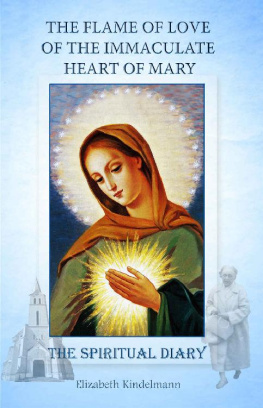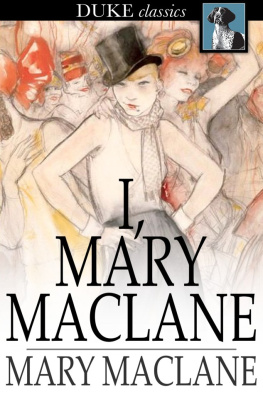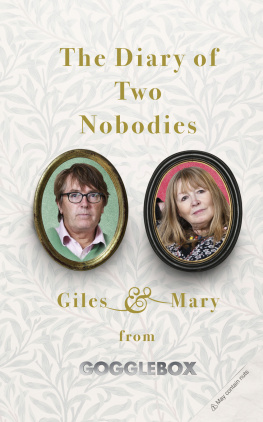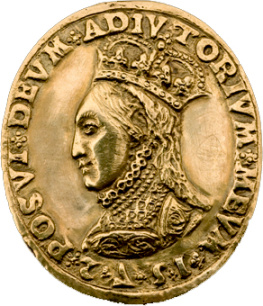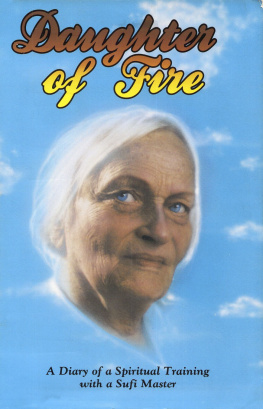Elizabeth Kindelmann - The Flame of Love of the Immaculate Heart of Mary - The Spiritual Diary
Here you can read online Elizabeth Kindelmann - The Flame of Love of the Immaculate Heart of Mary - The Spiritual Diary full text of the book (entire story) in english for free. Download pdf and epub, get meaning, cover and reviews about this ebook. year: 2019, genre: Religion. Description of the work, (preface) as well as reviews are available. Best literature library LitArk.com created for fans of good reading and offers a wide selection of genres:
Romance novel
Science fiction
Adventure
Detective
Science
History
Home and family
Prose
Art
Politics
Computer
Non-fiction
Religion
Business
Children
Humor
Choose a favorite category and find really read worthwhile books. Enjoy immersion in the world of imagination, feel the emotions of the characters or learn something new for yourself, make an fascinating discovery.
- Book:The Flame of Love of the Immaculate Heart of Mary - The Spiritual Diary
- Author:
- Genre:
- Year:2019
- Rating:3 / 5
- Favourites:Add to favourites
- Your mark:
- 60
- 1
- 2
- 3
- 4
- 5
The Flame of Love of the Immaculate Heart of Mary - The Spiritual Diary: summary, description and annotation
We offer to read an annotation, description, summary or preface (depends on what the author of the book "The Flame of Love of the Immaculate Heart of Mary - The Spiritual Diary" wrote himself). If you haven't found the necessary information about the book — write in the comments, we will try to find it.
The Flame of Love of the Immaculate Heart of Mary - The Spiritual Diary — read online for free the complete book (whole text) full work
Below is the text of the book, divided by pages. System saving the place of the last page read, allows you to conveniently read the book "The Flame of Love of the Immaculate Heart of Mary - The Spiritual Diary" online for free, without having to search again every time where you left off. Put a bookmark, and you can go to the page where you finished reading at any time.
Font size:
Interval:
Bookmark:
THE FLAME OF LOVE OF THE IMMACULATE HEART OF MARY
The Spiritual Diary
Elizabeth Kindelmann
On June 6, 2009, the original Hungarian Spiritual Diary of Elizabeth Kindelmann received the Imprimatur number 494-4/2009 from Cardinal Pter Erd, Archbishop of Esztergom-Budapest and Primate of Hungary.
The cover image representing the Virgin Mary of the Flame of Love is a creation of the Austrian artist Erwin Schppl of Regensburg, Austria, 1977.
Second Edition
2019 The Flame of Love of the Immaculate Heart of Mary, Inc.
All Rights Reserved. No part of this publication may be reproduced, stored or transmitted in any form without the prior written permission of the Publisher.
The Flame of Love Movement in Canada
P.O. Box 21111, Postal Station Jacques-Cartier
Longueuil, Quebec J4J 5J4
Phone: 579-721-4027
The Flame of Love Movement in the USA
41 E Baltimore Ave
Lansdowne, PA 19050
www.flameoflove.us
Phone: 610-622-4257
CONTENTS
ELIZABETH KINDELMANN
Budapest, Hungary

Elizabeth Kindelmann, maiden name Sznt, was born on June 6, 1913 at Saint Stephen's Hospital, in Kispest, Hungary. She was baptized on June 13, 1913.
From the posthumous writings of her spiritual director, who died in 1976, we learn that she came from a poor family. Her parents were Joseph Sznt, printer (1871-1917) and Ersbet Mszros (1878-1924). Her father was Protestant and her mother Catholic. The children were educated and raised as Catholics.
Elizabeth had twelve brothers and sisters, six pairs of twins. She was the thirteenth child, the only one not a twin. She was the only child to make it to adulthood. Seven of her siblings died during the Spanish Plague of 1919. Two died in the aftermath of diphtheria and two more died accidentally. Another brother died as an infant, and Elizabeth never got to know the cause of his death.
"Following my father's death, and from 1917 to 1919, I was raised by my maternal grandparents in Seresznyspuszta, in the countryside. Because of my frail health the physician advised me to live in the countryside. From that period of time, I cannot recall being taken to the church of Szekazard located some fourteen kilometers away. All I can remember is that my grandmother always wore a Rosary around her wrist even while she was feeding the chickens and the hogs.
From September 1919 to June 1923, I attended the elementary school for girls on Pannonia Street, in Budapest."
As part of an international assistance initiative, on November 8, 1923, Elizabeth was sent to Switzerland, to the family of a wealthy agricultural machinery manufacturer in Willisau. "From the weak child that I had been, I became a young girl under the care of French and German governesses growing in weight from twenty-one to thirty-eight kilos."
"In November 1924, purely out of love, I came back to Budapest to look after my ailing mother who was seriously ill and bedridden. Towards the end of 1924, my foster parents of Willisau wanted to adopt me and take me back to Switzerland. I was to meet them at ten o'clock at the Graz railway station (Austria). I got there at 10:00 p.m. as opposed to 10:00 a.m. when they were actually expecting me. Incredibly, it is this mishap that changed the course of events affecting my life and leading me to fulfill my mission in Hungary. At the time, a young Hungarian couple took me back to Budapest.
By the age of twelve, I was working in the household of my maternal uncle in Vajta for the period running from Easter up to the corn harvest. I simply could not stand the crass laziness of my cousins, three boys and a girl and I slipped out without a word and I went back to Budapest.
From November 1925 to June 1926, I was working as a maid in the countryside for the mother of a man of significant influence. I had to work from morning to evening having to survive on a single meal for the whole day. My social condition was indeed pitiful, suffering from severe hunger. So, I packed up my things and simply left for downtown.
Under the carriage port of a small, dilapidated house, I noticed a not so friendly older woman holding an empty siphon (bottle) of Seltzer water. She looked at me and called me over. She asked me to go buy her a bottle of Seltzer water at the bar across the street. She gave me the money and watched to see whether I would comply with her request. Upon returning with the Seltzer, she proceeded to question me. Then she let me into the house and gave me breakfast. I was hired to look after her small garden in exchange for meals. There were very strange visitors living there. I actually had to fight off with considerable loud yelling a young man who frequently came to the house. I left the same day and kept on wandering with my meager belongings.
On August 10, 1926, I went to the Church of Perpetual Adoration on lloi Avenue. When the time came to close the church, I went on wandering until I found a bench on Matyas' Place. The policeman patrolling the area had pity on me and did not send me away. When morning arose, I went to the Church of the Sacred Heart of Jesus, where I slept through the Mass. Once warmed up, I went out roaming around looking for work.
Close by the church of Jozsefvaros, there was a creamery and on the door a note that they were hiring people to distribute bottles of milk. I introduced myself and was hired on the spot, but I was also told I could only start three days later, the time when the current carrier would leave the job. What would I do meanwhile? On Koszuru Street, I came across a factory hiring people on the spot to crack nuts. The employees would sit alongside a table each with two baskets. The nuts taken from one were shelled and placed in the other. Each employee's production was weighed. They paid four fillers an hour, and for ten fillers I could buy myself five croissants at the Teleki marketplace, the cheapest in the city.
Later, I strolled to the Franciscan Fathers who gave me a small amount of money and I shared my bread with a starving woman. We ate it right away sitting on a bench at the marketplace. The Franciscans suggested that I see the Sisters on Maria Street, who effectively gave me shelter for one pengo. Hunger drove me to steal and I was ashamed of myself. I went to confession. The priest who heard my confession was moved to tears and he assured me that I had committed no sin, for misery was what had forced me to steal. Later, the Sisters would charge me nothing for lodging."
"In my misery and deprived of any human support I had to go from employer to employer for any additional remuneration and improved conditions. For the same work in a creamery on Baross Street, the Eighth District of Budapest, I was given six pengos and free lunch. The third creamery, also on Baross Street, in effect provided me with a satisfactory livelihood for almost a year. Materially, this job turned out to be the best one I ever held. I was earning eight pengos and working only from 5:30 a.m. to 11:30 a.m. I spent all my free time praying most often at the Church of Perpetual Adoration. I attended the office of Perpetual Adoration regularly. To earn more, I worked in a factory peeling potatoes, that payed two fillers for ten kilos of production. In three hours, I could earn twelve fillers. Further, I was supplementing my income by selling sweets in a small suburb cinema. I did not pay attention to the projections, I would simply take an available seat and meditate on God. The managing lady often borrowed small sums from me and once her indebtedness rose to twenty pengos, she simply fired me.
I also became an occasional grocery bag-carrier at the local market in the Ninth District. Early at 6:00 a.m., I would go to the local market offering my services to the ladies doing their shopping. Once we got back to their house, many times I would be invited to stay for breakfast. This is how I met a middle class family in Budapest and thanks to whom I was able to take classes at the school of nursing on Dohany Street in the Eighth District. However, it would be another ten years before I would put my nursing skills to actual practice at the Hospital of the Franciscan Sisters and at a hospital on Tarogato Avenue, dedicated to patients afflicted with tuberculosis.
Font size:
Interval:
Bookmark:
Similar books «The Flame of Love of the Immaculate Heart of Mary - The Spiritual Diary»
Look at similar books to The Flame of Love of the Immaculate Heart of Mary - The Spiritual Diary. We have selected literature similar in name and meaning in the hope of providing readers with more options to find new, interesting, not yet read works.
Discussion, reviews of the book The Flame of Love of the Immaculate Heart of Mary - The Spiritual Diary and just readers' own opinions. Leave your comments, write what you think about the work, its meaning or the main characters. Specify what exactly you liked and what you didn't like, and why you think so.

